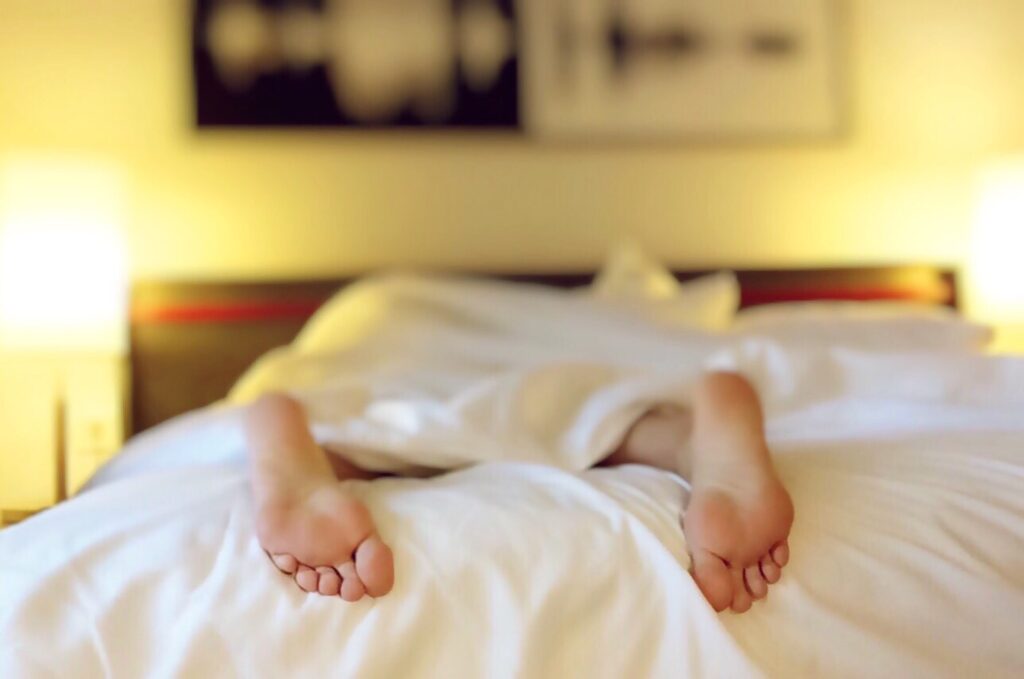Does your hair start to fall out after experiencing a significant life event such as a breakup? Stress-induced hair loss is a common medical condition known as telogen effluvium, which is usually temporary.
It occurs 2-3 months after the stressful event and could take a few months to a year to fully recover. So how to regain hair loss from stress? Well. In this article, I will include the top methods that help regrow hair after stress, how stress causes hair loss, how to tell if you suffer from stress hair loss, how long it takes for the hair to grow back, and more FAQs.
Let’s get started…
Table of Contents
How To Regain Hair Loss From Stress?
1- Maintain A Healthy Diet
A healthy diet is one of the major steps that lead to an improvement in your overall health, not just hair health. A study showed that emotional stress, starvation, and crash dieting are the top causes of telogen effluvium.
So if you want healthy strong hair, you should consume healthy nutritious meals daily.
Add vegetables, leafy greens, nuts, whole grains, fruits, and protein to your diet. Vegetables, leafy greens, and fruits are high in fiber, antioxidants, minerals, and vitamins that will help boost hair health.
Also, hair is made from keratin, which is a type of protein. This means you should consume enough protein per day to recover from stress-related hair loss.
Plus, whole grains and nuts are high in fiber, protein, vitamins, and minerals that your body needs to prevent hair loss from stress.
Related: 23 Easy Pro Secrets On How To Keep Your Hair Healthy

2- Opt For Supplements
If you wonder how to regain hair loss from stress, it’s highly recommended to take vitamin and mineral supplements. A study found that nutritional deficiencies can lead to stress-related hair loss.
The Har Vokse hair loss supplement contains 10 essential vitamins, minerals, and amino acids your body needs so it can promote scalp and hair health.
It’s packed with:
- Vitamins E, B6, & B7 (Biotin).
- Rosemary leaf extract.
- Copper.
- Selenium.
- Amla extract.
- L- Arginine.
- L-Cysteine.
- Hydrolyzed marine collagen.
Those beneficial ingredients help boost new hair growth, keep hair follicles strong, prevent hair receding, treat hair thinning, hydrate the scalp and moisturize hair, and keep existing hair fortified.
Plus, this supplement is clinically proven to boost hair regrowth in 63.9% of participants. And it’s recommended by dermatologists.
The Har Vokse hair loss treatment works for both men and women, and it’s easy to take. Check it out here:

3- Massage Your Scalp
Scalp massaging boosts blood flow in the scalp which will promote scalp health and increase hair growth. It can help regrow hair on bald spots fast.
Plus, massaging the scalp every day can reduce stress and anxiety levels which will help you recover from stress-related hair loss.
Furthermore, using oils like tea tree oil or rosemary oil to massage the scalp may stimulate healthy hair growth.
So How To Do it? Use your fingertips to gently massage your scalp in circular motions for 3-5 minutes per day.
Related: How To Regrow Hair On Bald Spot Fast In 11 Effective Ways?
4- Use Hair Growth Products
Topical hair care products can encourage new thicker and stronger hair to grow and promote scalp health.
Shampoos, conditioners, and serums that contain aloe vera, caffeine, ashwagandha, tea tree oil, moringa oil, or rosemary oil can help you recover from stress-related hair loss.
Also, topical treatments that are formulated with Minoxidil can work together with hair loss supplements to support hair health and boost hair growth.
5- Sleep Well
You can easily reduce stress levels when you get enough sleep each night. It’s best to sleep 7-9 hours per night to keep your body relaxed and relieve stress and anxiety, which will help regrow hair and keep it glowing.
If you can’t sleep well at night, try to:
- Exercise 3-5 times a week.
- Avoid taking naps longer than half an hour.
- Don’t drink caffeinated drinks or alcohol at night.
- Don’t consume heavy meals before sleeping.
- Avoid bright screens at least 2 hours before bedtime.
- Sleep in a cool and dark room.
- Meditate daily.
- Stick to a regular sleep schedule.

6- Manage Stress Levels
Wondering how to regain hair loss from stress? Practicing stress management techniques is the ideal way that helps regrow healthy hair again.
You must know in order to boost hair regrowth, you need to relieve or reduce stress levels. So what should you do?
- Meditate every day for at least 5-10 minutes. It helps release stress and keep your mind relaxed.
- Write down your thoughts so you can clear your mind and stop overthinking.
- Practice deep breathing exercises daily to lower stress levels.
- Do yoga as it’s one of the top stress-relieving exercises.
- Go for a walk.
- Spend more time with your friends or family.
- Talk to your friends or family about your thoughts and feelings.
- Spend more time in nature.

What Are The Types Of Stress-Related Hair Loss?
1- Telogen Effluvium
This condition is one of the most common reasons that lead to stress-related hair loss. It’s a temporary condition that occurs after experiencing a stressful event and once the stressor is removed, your hair will grow back again.
2- Alopecia Areata
It’s an autoimmune disorder where the immune system attacks the body’s hair follicles and makes your hair fall out. This condition could even target your eyelashes, eyebrows, and other areas of the body.
3- trichotillomania
This condition is also known as a hair-pulling disorder where one starts to pull out the hair on his head and in other areas like eyebrows and eyelashes. Trichotillomania is common in teenagers and it usually needs therapy.
So it’s best to talk to a dermatologist if you experience hair loss so he/she can tell you the root cause and help you boost your hair health.
Does Stress Cause Hair Loss?
Yes. Stress can affect your overall health including your hair health significantly, and this can lead to hair loss.
If you experienced stressful events like divorce, breakup, financial problems, loss of a beloved one, pressure from exams, or job loss, this could probably lead to stress-induced hair loss.
Also, physical stressors including surgery, illness, having a baby, or an accident can cause stress-related hair loss.

How Does Stress Cause Hair Loss?
First, you should know it’s normal to lose 50-100 strands of hair each day. And each hair follicle grows in a cycle that includes a growth phase, resting phase, and shedding phase.
Usually, most of the hair on your scalp is on the growth cycle and only about 10% of it is in the resting phase.
But after going through a stressful event, more than 20% of your hair enters the resting phase and then the shedding phase. This means many hairs will start to fall out at the same time for a few months.
Also, high-stress levels make your body release cortisol, known as the stress hormone, which triggers a fight-or-flight response. This reaction reduces blood circulation in the skin and redirects essential nutrients to your vital organs.
But your hair is not considered vital which means the nutrients your hair needs may not be delivered, and this may lead to stress-related hair loss.
Furthermore, the stress hormone, Cortisol, breaks down proteoglycan which is a skin substance that is essential for regular hair growth.
Scientists believe this could be the reason why your hair falls out when you’re stressed.
How To Tell If Hair Loss Is From Stress?
If you were going through a stressful event, chances are your hair would fall out 3-6 months after the event.
Also, people who experience hair loss due to stress will notice shedding across the entire scalp, not in one spot like those with alopecia areata.
Your ponytail may look smaller and hair parting gets wider.

How Long Does Hair Loss From Stress Take To Come Back?
Usually, when the problem or the stressor disappears, your hair will grow back again. And if you can get your stress levels under control, new thicker, stronger hair will regrow.
But if you notice patchy hair loss when washing or brushing your hair, it’s highly recommended to consult a dermatologist.
FAQs:
Does Hair Loss From Stress Ever Grow Back?
Yes. Hair loss due to stress is temporary, meaning, once the stressor is removed, your hair will grow again.
What Does Stress Hair Loss Look Like?
You would notice a sudden shedding across the scalp as it’s not concentrated in one spot. But don’t worry, your hair will grow back once you control your stress levels.
What Vitamins Should I Be Taking For Hair Loss?
– Vitamin B7 (Biotin).
– Vitamin D.
– Vitamin C.
The Bottom Line
Learning how to regain hair loss from stress is the ideal way that will help you know more about stress hair loss, how to manage it, and how to regrow healthy strong hair again.
Consuming healthy meals, taking supplements, massaging the scalp regularly, sleeping well, using hair growth products, and reducing stress levels will definitely make the hair regrowth journey easier and quicker.
Also, it’s best to consult a dermatologist if your hair falls out more than usual. He/she will examine your scalp and tell you the reason why your hair sheds and prescribe the right medications if you need to.
Feature Image Source: https://www.pexels.com/@iiii-iiii-10613/
* It’s best to consult a healthcare provider before adding any new supplements to your diet.
* Hey Gorgeous! The Nfrw is reader-supported and I may earn commissions if you purchase products from retailers after clicking on a link from the site.
